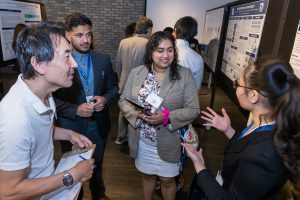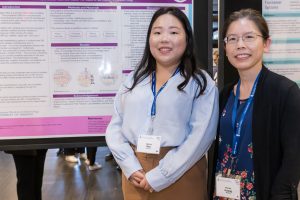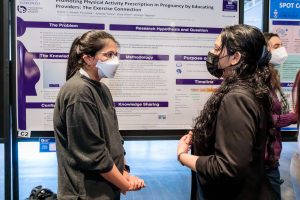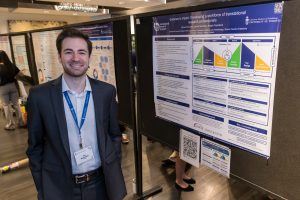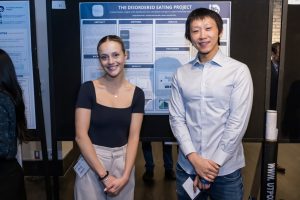The Program
The Master of Health Science in Translational Research (Translational Research Program, TRP) is a two-year professional degree program that enables students to integrate their domain expertise with a facilitated collaborative capstone project that emphasizes experiential learning and translational thinking.
Why join the TRP?
Listen to the message from our Director,
Dr. Joseph Ferenbok
How you'll be taught
Class sizes
The Translational Research Program accepts a limited number of students each year. This means class sizes are smaller which results in a personalized experience for students.
Competency-based learning
At the TRP, you’ll enhance your skills as a researcher, clinician, health professional, or industry expert by developing the competencies needed to advance health innovation. We facilitate learning through guidance, mentorship, feedback, and support rather than didactic lecturing and summative evaluation. Through hands-on learning, you’ll gain competencies in:
- Adaptability
- Continuous Learning
- Conflict Management/Resolution
- Creative Problem Solving
- Critical Thinking
- Effective Communication
- Initiative
- Integrity
- Leadership
- Relationship Management
- Risk Management
- Team collaboration
Grading
At the TRP we strive for performance-based learning where students develop and document major competencies through the curriculum (and program). The demonstration of competencies, that is their application to a specific task or project can be assessed as performance-based learning. This means we don’t use letter or percentage grading. This approach is intended to clearly link the program mission to the learning outcomes, assessment tools and overall competencies required of its graduates.
Personalized experience
Approaches for program delivery are supplemented by personalized goal setting through Individual Development Plans (IDPs) and reflection. Each student meets individually with their TRP advisor every term to set and review personal goals and accomplishments. The IDP is an important aspect of the TRP’s personalized learning. This process allows students to focus on goal setting and self-evaluation involving actions and activities that they self-initiate under the supervision of a program faculty advisor.
Experiential learning
Built into our program are opportunities for students to choose topics and areas of focus, as well as help contribute to learning outcomes of each class session.
We want students to focus on:
- Direct observation and engagement
- Reflection and abstraction of their experiences
- Integrating their previous knowledge
- Testing and evaluation in real-world contexts
Collaboration and teamwork
Teamwork and collaboration are heavily emphasized in the program. Team building and negotiation elements are incorporated within the curriculum and we use strategies like Team Charters, peer review, and an individual evaluation mechanism to ensure group work goes smoothly.
Class protocol
Students are required to be engaged in class through active listening and participation. The amount of effort and involvement you put into your learning will determine how much you get out of the program.
Research
The TRP curriculum is designed to build towards the Capstone Project. Capstone projects challenge students to propose, refine, and execute an original work in Translational Research to integrate conceptual and practical skills into competencies and perspectives within a real-world setting with actual stakeholders; and to reflect on the approaches and strategies employed to generate and integrate deeper learning for future projects. In this sense, the capstone project is both a mechanism for ‘learning by doing’ and a vehicle for generating best practices and principles of translating research.
Extracurricular opportunities
TRP students seek out opportunities outside of class time to expand their horizons, share their knowledge with the public and set themselves up for future successes. Opportunities like pitch challenges, research conferences and hackathons are all things that TRP students get involved with.
Learn to think differently
Driving impact and innovation in health and care requires you to change the way you think. You will learn to:
Identify person-centric and ingenuity gaps
Scope problems and verify assumptions
Test and iterate on real-world projects to translate discoveries into action
Embrace ambiguity
Joseph Ferenbok
Gabriella Chan
Edyta Marcon
Courses & schedules
All students in the Translational Research Program will be required to complete a total of 8.0 Full-Course Equivalents (FCEs). This generally looks like 5 – 6 terms or 2 years of full-time study.
Core courses
These are the mandatory classes you must take to complete the program. You will automatically be enrolled in these courses and they will be preloaded to your ACORN (UofT’s learning system) before the given semester.
Modules
These are a choice of modular courses you can choose depending on your interests. We change these regularly to offer different opportunities and keep the program up to date.
Students are required to complete eight modules (0.25 FCE each) spread out within 2 years of study. Students may enroll in modular courses using ACORN. The modular schedule will be emailed to students prior to the start of each semester. Modules offered outside of the program are also permitted such as ones offered by the Institute of Medical Science (IMS).
Electives
These are certain courses available across many graduate programs at UofT – not necessarily specific to the TRP but you can choose to supplement your interests and learning.
To complete your degree requirements, you need to take 2 electives for a total of 1.0 FCE (courses offered outside the program). Students have taken courses related to their Capstone projects in Health Policy, Knowledge Media Design, Bio Statistics, Engineering and Computer Science—to name a few.
We recommend that you take your electives in year 2. Electives should contribute to your learning outcomes, capstone project or career objectives. Before registering, students must first discuss their choices with their TRP Individual Development Plan (IDP) advisor. Electives must be graduate-level courses.
Your choice of elective must be approved by the TRP prior to the final registration date of the given term.
Research
Your degree culminates in a Capstone Project. Capstone projects are an opportunity for students to identify, propose, and execute a meaningful translational research project with tangible benefits for human health. Take a look at current and previous capstone projects to get a sense of the kind of research TRP students are conducting.
